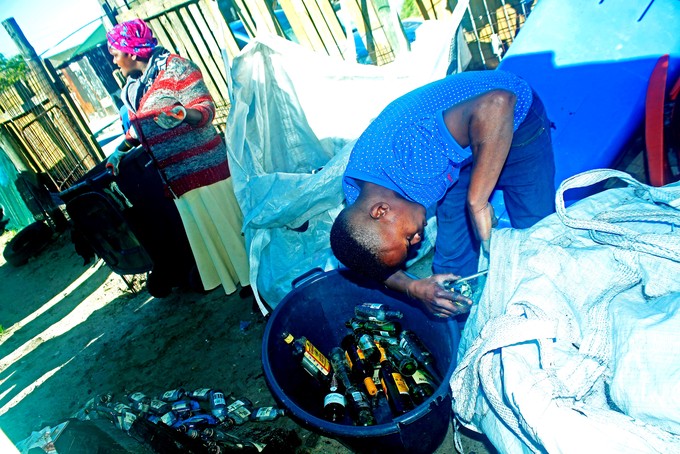Recyclers say how their lives could be made easier
Waste pickers in Khayelitsha ask for designated landfills
Nompumelelo Njana has been working as a waste picker since 2008. She says the money she earns from recycling has steadily decreased over the years.
“As waste pickers … it is difficult … because we do not have landfills designated for us and our work,” she says. “We have to do our work in our yards and our neighbours are starting to complain, saying that we attract rats to their yards and houses.”
Njana’s yard is filled with huge white plastic bags in which she stores her bottles and cans.
“If we had landfills, then we could even start recycling projects where we can work together as communities and even have opportunities for our youth. There is so much that can be done with waste; for instance, there is a man in [Khayelitsha] Site C who uses cans to make bags and caps.
“Even when government distributes equipment for waste pickers, we don’t get, because they focus on those pickers that have projects. Even now, we were told that wheelie bins would be given out, but I’m sure we will not receive them, because we are always forgotten,” says Njana.
“You can work a whole month and only get R200, that’s if you work hard and fill up a whole bag. Otherwise you’re lucky to get a R100. With bottles we get between 30 cents to one rand a kilo. With cans, if they are magnetic, then you get money – about 70 cents or 80 cents.
“At the moment things are going slow because it is winter. People are drinking less, taverns are not full,” she says.
Njana stopped working in 1997 after she was involved in a car accident. Her left side does not function fully and she limps when she walks.
“I used to get R800 per month after my accident, but it was only for two years. After those two years, I stopped receiving the [Road Accident Fund] money. So it got difficult, because I couldn’t get a job at 40 because I’m too old, and I couldn’t get an old age pension because I’m too young. So I thought of ways to make money and that is when I started being a waste picker.”
Njana starts her day at around 5am. She has six children; four of them already out of school. Her one son finished matric last year, but Njana and her husband cannot afford to pay for him to further his education.
She collects cans, plastic bottles, glass bottles and cardboard with a municipal wheelie bin from around Site B on the streets, at taverns and at private parties.
About 300 waste pickers have now formed a movement in Khayelitsha. They don’t have uniforms, but each member contributed R50 to a fund to buy overalls, T-shirts, goggles and gloves. Some of the members do the collecting and recycling every day, but Njana can only manage weekends, because of her health. She mostly targets taverns.
Njana sorts out the waste with Vuyolwethu Dayeni, one of the unemployed youths who joined the movement in the hopes of making some money.
Next: Education funding formula needs to be fixed
Previous: Man accused of assault in Xolobeni is ANC election candidate
© 2016 GroundUp. 
This article is licensed under a Creative Commons Attribution-NoDerivatives 4.0 International License.
You may republish this article, so long as you credit the authors and GroundUp, and do not change the text. Please include a link back to the original article.



